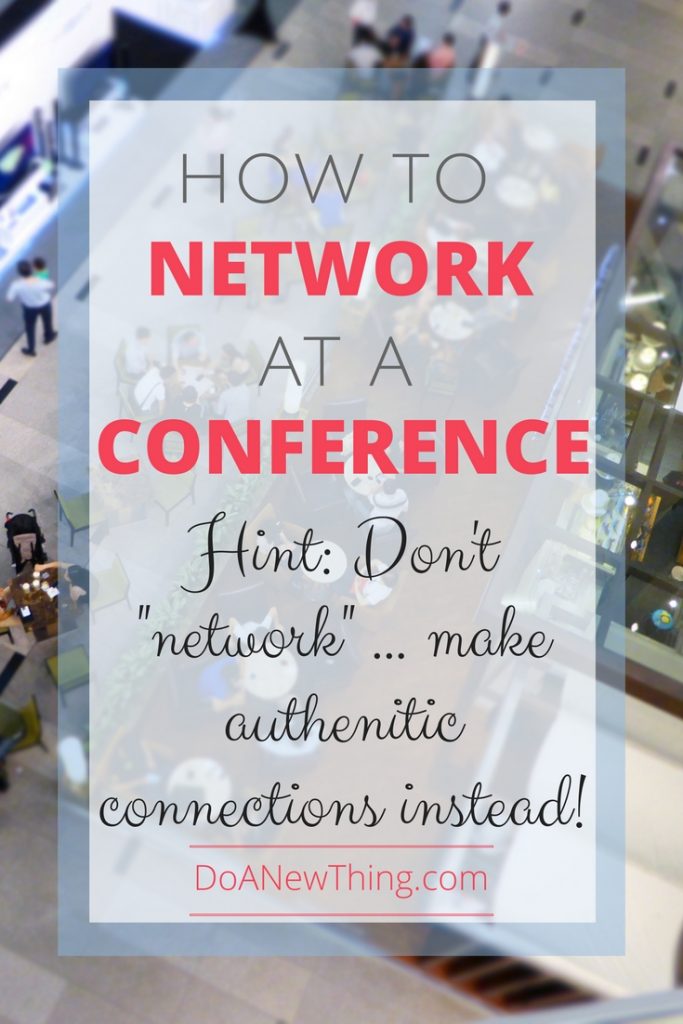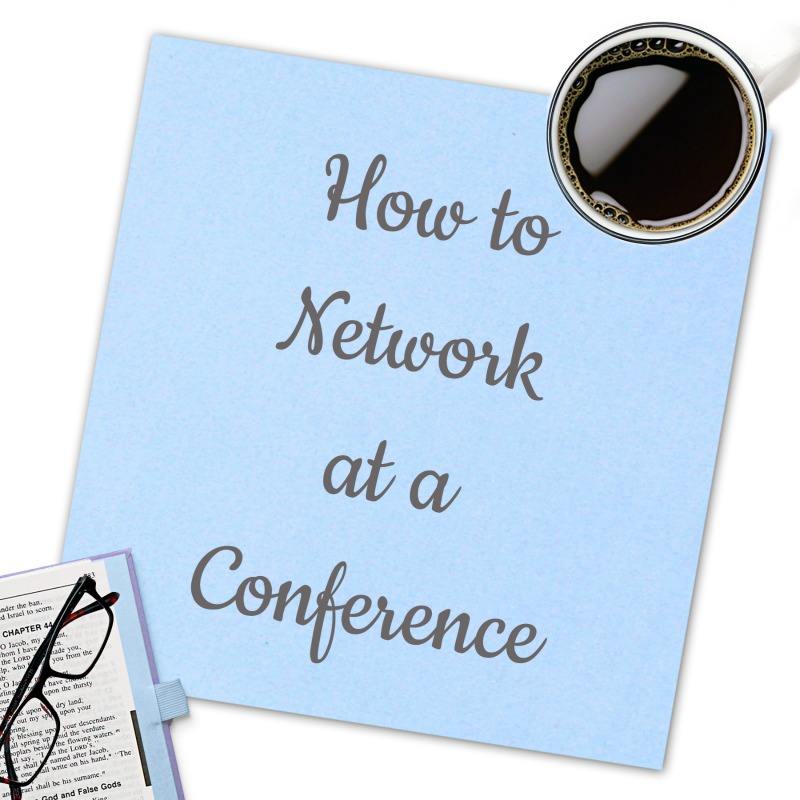 Conference season is almost here and amidst all the preparation and arrangements, we sometimes forget about one of the most important parts of attending a conference …. networking.
Conference season is almost here and amidst all the preparation and arrangements, we sometimes forget about one of the most important parts of attending a conference …. networking.
Maybe we forget about it because it can be the most awkward, nausea-inducing part of the experience, especially for those who are most comfortable doing their social thing with a computer screen between themselves and other people. (Shyly slipping my hand up … anybody else?)
Just the terms “networking” and “working the room” can bring to mind some negative connotations — the cheesy salesman looking for the next sale — the perfectly put-together mean girl looking for the other “beautiful people.” And when you think of networking as what you can get out of it and how it can benefit you, then it is pretty cheesy.
So I try to think of it more as a way to make authentic connections with people who all have the same ultimate goal … to bring a hurting world to the healing feet of Jesus. In fact, Jesus and his friends were great at making these kinds of connections themselves. Jesus invited a tax collector named Matthew to follow him, and then Matthew invited all his friends to dinner to meet Jesus. Paul wrote letters to keep in touch with dozens of people, using his influence on behalf of a slave and using his connections to bring people together.
As Christians, making connections comes more naturally than networking. But still, it takes some practice and a bit of thinking ahead to get truly comfortable with it.
Truth and Lies
As soon as you walk in that room, your mind will start thinking all kinds of crazy thoughts. It’s important to acknowledge the uncomfortable truths and refute the blatant lies:
These people are smarter/more experienced/more polished than me. Probably TRUTH. There is always someone who is ahead of you on their writing or ministry journey. Instead of allowing that to make you feel “less than”, use it as an opportunity to observe what progress looks like. Turn “I wish I was her” into “what can I learn from her?”
I’m not good enough to be here. Big fat LIE. Most conferences do not have “minimum entrance requirements” other than paying the fee and getting yourself there. That means the person only getting started is as welcome as the person who is on the verge of being “the next big thing.” Your calling is just as honorable, just as valid, just as important to invest in as anyone else’s.
She has the same idea as me. Maybe TRUTH. But she doesn’t have your story, your experience or your point of view. Our stories are all the same, because they aren’t our stories … they are God’s stories. But the way we share them and the way God worked them out are all different and all valuable.
Nobody wants to talk to me. LIE, for sure. You came to the conference to learn by connecting with others, and so did everybody else. YES … they ALL want to to talk to YOU! So put on a big smile, get your face out of your phone, and get ready to meet your public. Ok … that might be a little overboard … but be approachable and genuine and people WILL want to talk to you.
Practical Preparation
Before going to the conference, there are some practical things you can do to make your networking time more comfortable.
Connect on social media – Whether in a Facebook group or using a hashtag on Twitter or Instagram, it’s not difficult to find other people going to the conference. You may make arrangements to meet up at the conference, or you might even find people you already know who are going.
Research the speakers and conference details – I always say that information is my love language … having it and sharing it. I am most comfortable when I know all about what is going on and what to expect. It also allows me to guide others who have questions or need help.
Practice your elevator speech – Exactly 159 people are going to ask you some variation of what you do, what you write about, what your ministry is. So be prepared to tell them in a few words …. words that you would use in every day conversation. Practice so it rolls naturally off your tongue. Stay away from fancy titles to focus on what you do, who you do it for, and how it benefits them.
Instead of: “I’m the assistant director of Hurting Hearts at Home Ministries”
Try: “I teach coping skills to women in abusive relationships so they can make healthier choices in their lives.”
See how that opens the door to a deeper conversation? What you do leads to who you do it for leads to benefits.
Have some conversation starters ready – These will drive a stake in the heart of the awkward silence threatening to take over after you’ve both shared who you are and what you do:
- How did you hear about this event?
- I’m looking forward to _________’s presentation. Have you heard her speak before?
- What’s the most important thing you’ve learned today?
- Where do you hang out online? What’s your favorite social media platform?
- What’s the biggest struggle you are facing in your ministry?
- What resources have been the most helpful to you?
- What are you hoping to accomplish here?
These may seem kinda personal and deep, but that’s the point. True, authentic connection comes from sharing true, authentic conversation. And that is more important than empty compliments or how long the line at the bathroom is.
Making the most of networking time
Okay …. you’ve got your mental attitude straight and you are prepared for great conversation. Now what?
Put others before your own awkwardness – How can you use these interactions to serve others?
- Offer solutions or resources for their biggest struggles
- Connect people you’ve met with common interests. “You write for military spouses? I just met Sarah, who does too! Let me help you find her.”
- Grab an extra cup of coffee or bottle of water for the person sitting next to you.
- Look for the wallflowers around the edges and approach them the way you’d like to be approached.
Balance social time with alone time – You may want to hibernate in your room until 5 minutes before the speaker starts and go straight to bed after the last “amen.” But socializing before, between and after sessions and at meal times is an important part of the experience. And so is the sometimes rare opportunity to be away from home, with time to think, pray and process somewhere other than in the bathroom with kids knocking on the door! Spend plenty of time meeting and greeting, but, especially if you are an introvert exhausted by constant social interaction, be sure to grab some alone time to decompress.
Sit in the middle of the room – People in the front are often hyper-focused on the speaker and trying to avoid distractions. Those in the back sometimes need to duck out for an appointment. The middle-of-the-room’ers are more likely to be open to chit chat before and after the presentation.
When you get home
You may think you are safe now, but connecting continues after you get home. Take the business cards you collected and divide them into two piles: One pile for people that you met and just want to stay in touch with, and another pile for people who made a deeper impression on you.
For the first pile, connect with them on social media and maybe post on their timeline or send a private message saying how nice it was to meet them.
For the second pile, send personal notes or emails thanking them for spending time with you and offering specific ways you’d like to stay connected with them.
I’m not promising that networking time won’t be awkward or uncomfortable. But with a little preparation and confidence inspired by your God-dream, you can make it through without throwing up in your purse. That’s progress!
RESOURCES
These posts have some other great tips on how to network at a conference:
10 Tips on Networking Like A Pro at a Conference – Jeff Goins
How to Small Talk – SaveToSplurge.com
8 Great Icebreakers for Your Next Networking Event – Meredith Lepore for Levo.com (the conversation about a “whatsit” in the Comments of this article is really interesting!)
What are some of your favorite tips for making authentic connections at a conference or event?
Linking up with Susan Mead at #DanceWithJesus and Arabah Joy at #GraceandTruth
4 thoughts on “How to Network at a Conference”
Leave a Reply to Glynnis Whitwer Cancel reply
Is your to-do list out of control?
Grab my best to-do list tips and learn to overcome the de-railers in your week



Great tips, Christa! Just by sharing these tips shows you live your message to care authentically about others!! Thanks so much.
These are good tips not just for conferences, but for anywhere that we are with a group of people. “Turn “I wish I was her” into “what can I learn from her?” So good! Thanks for sharing, Christa.
Love these tips, Christa! Especially your idea for an elevator pitch. Great illustration that inspires ideas!